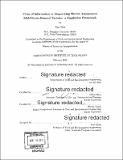Value of information in dispatching shared autonomous mobility-on-demand systems : a simulation framework
Author(s)
Wen, Jian, S. M. Massachusetts Institute of Technology
DownloadFull printable version (6.365Mb)
Other Contributors
Massachusetts Institute of Technology. Department of Civil and Environmental Engineering.
Advisor
Jinhua Zhao and Neema Nassir.
Terms of use
Metadata
Show full item recordAbstract
The concept of shared mobility-on-demand (MoD) systems describes an innovative mode of transportation in which rides are tailored as per the immediate requests in a shared manner. Convenience of hailing, ease of transactions, and economic efficiency of crowd-sourcing the rides have made these services very attractive today. It is anticipated that autonomous vehicle (AV) technology may further improve the economics of such services by reducing the operational costs. The design and operation of such an shared autonomous mobility-on-demand (AMoD) system is therefore an important research direction that requires significant investigation. This thesis mainly addresses three issues revolving around the dispatching strategies of shared AMoD systems. First, it responds to the special dispatching need that is critical for effective AMoD operation. This includes a dynamic request-vehicle assignment heuristic and an optimal rebalancing policy. In addition, the dispatching strategies also reflect transit-oriented designs in two ways: (a) the objective function embodies the considerations of service availability and equity through the support of various hailing policies; and (b), the service facilitates first-mile connections to public transportation. Second, this thesis models the interaction between demand and supply through simulation. Using the level of service as interface, this mechanism enables feedback between operators and travelers to more closely represent the choices of both parties. A fixed-point approach is then applied to reach balance iteratively, estimating both the demand volume and the system performance at equilibrium. The results from the simulation support decision-making with regard to comprehensive system design problems such as fleet sizing, vehicle capacities and hailing policies. Third, the thesis evaluates the value of demand information through simulation experiments. To quantify the system performance gain that can be derived from the demand information, this thesis proposes to study two dimensions, level of information and value of information, and builds up the relationship between them. The numerical results help rationalize the efforts operators should spend on data collection, information inference and advanced dispatching algorithms. This thesis also implements an agent-based modeling platform, amod-abm, for simulating large-scale shared AMoD applications. Specifically, it models individual travelers and vehicles with demand-supply interaction and analyzes system performance through various metrics of indicators. This includes wait time, travel time, detour factor and service rate at the traveler's side, as well as vehicle distance traveled, load and profit at the operator's side. A case study area in London is selected to support the presentation of methodology. Results show that encouraging ride-sharing and allowing in-advance requests are powerful tools to enhance service efficiency and equity. Demand information from in-advance requests also enables the operator to plan service ahead of time, which leads to better performance and higher profit. The thesis concludes that the demand-supply interaction can be effective for defining and assessing the roles of AV technology in our future transportation systems. Combining efficient dispatching strategies and demand information management tools is also important for more affordable and efficient services.
Description
Thesis: S.M. in Transportation, Massachusetts Institute of Technology, Department of Civil and Environmental Engineering, 2018. Cataloged from PDF version of thesis. Includes bibliographical references (pages 87-91).
Date issued
2018Department
Massachusetts Institute of Technology. Department of Civil and Environmental EngineeringPublisher
Massachusetts Institute of Technology
Keywords
Civil and Environmental Engineering.